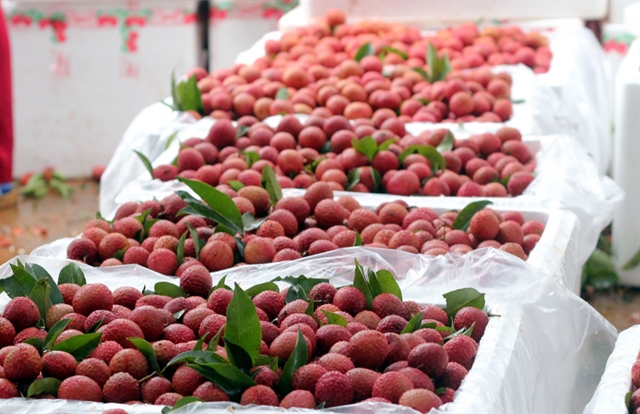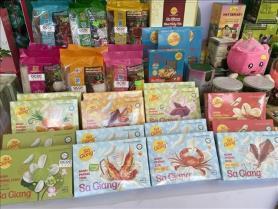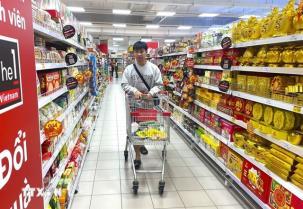The event followed a directive speech by General Secretary Tô Lâm, which urged early implementation of the “Month of Listening to the People.” It also translated the Prime Minister’s 2024 dialogue with farmers into concrete actions, emphasising the need for closer contact with farmers and cooperatives.

HÀ NỘI — Việt Nam is setting its sights on boosting agricultural exports to US$70 billion by the end of 2025 and $100 billion by 2030, as officials and farmers gathered for the 10th National Farmers’ Forum in Hà Nội yesterday.
Held under the theme 'Connecting Markets – Building Brands – Promoting Agricultural Consumption, Contributing to Double-digit Economic Growth,' the forum was co-organised by the Vietnam Farmers’ Union and the Ministry of Industry and Trade (MoIT) as part of the 'Proud Vietnamese Farmers 2025' programme with Nông thôn Ngày nay/Dân Việt newspaper and Bình Điền Fertiliser JSC.
The event built on directives from Party General Secretary Tô Lâm, who has urged early implementation of the 'Month of Listening to the People,' and on outcomes from the Prime Minister’s 2024 dialogue with farmers, calling for stronger links with cooperatives and farming households.
Chairman of the Vietnam Farmers’ Union Lương Quốc Đoàn reported that agro-forestry-fisheries exports hit a record $62.5 billion in 2024, placing Việt Nam among Asia’s leading farm exporters. By August this year, the figure had already reached $45.57 billion, with ten product groups — including rice, coffee, cashew, pepper, shrimp, tra fish and wooden goods — each surpassing the $1 billion mark. Vietnamese produce is now exported to more than 190 markets, including the United States, Japan and the EU.
Đoàn also warned of persistent obstacles. Exports are still largely raw, with limited added value and weak branding; 80 per cent of products remain untrademarked; logistics and warehousing lag behind; and congestion at border gates continues. Meanwhile, tougher trade barriers and rising competition in global markets pose further challenges to growth
Farmers’ concerns
Chảo Thị Yến of the Goong Indigenous Knowledge Cooperative (Lào Cai Province) said her group had brought Dao ethnic herbal products onto e-commerce platforms but faced three obstacles: high platform fees on already low margins, complicated procedures and shipping costs sometimes double the product’s value.
“If we lower prices, we lose money; if we raise them, we lose competitiveness. Even quality products struggle to reach consumers,” she said.
Director-General of the MoIT's E-commerce and Digital Economy Department Lê Hoàng Oanh said the ministry had issued a National E-commerce Development Strategy for 2026–30. While unable to control platform fees or freight rates, the ministry is working with Shopee, Lazada, Tiki, TikTok and Amazon to support product promotion, provide training and encourage collective transport models that reduce costs. For example, in the Northwest, farmers now jointly ship rice to cut expenses. Major promotional events such as Online Friday are also being promoted.
A key development will be the National Assembly’s expected passage of the E-commerce Law in October, providing a legal framework to protect consumers and facilitate online participation for producers and farmers. The ministry pledged to support around 100 priority products with free platform listing, reduced logistics costs and promotion of cross-border e-commerce.
Minister of Industry and Trade Nguyễn Hồng Diên reaffirmed agriculture’s role as a pillar of the economy, contributing to growth, trade surplus and exchange-rate stability. However, he stressed that added value in agro-forestry-fisheries exports remains only 26–28 per cent as most products are unprocessed. Unlocking potential requires close cooperation among the State, businesses, banks, scientists and farmers — the so-called 'Five Stakeholders Linkage' — to build an ecosystem supporting production, processing, consumption and export.
He pledged that the ministry will continue to develop markets, build a national brand for Vietnamese produce, promote deep processing, encourage innovation and modernise logistics. He described the forum’s theme as 'accurate and relevant' and affirmed readiness to address obstacles raised by farmers, enterprises and localities.
Concluding, the Chairman of the Vietnam Farmers’ Union stressed the strategic direction for the coming years: increase value-added, build green and sustainable brands, expand exports and develop e-commerce and logistics to achieve the $100 billion export target by 2030. Strengthening the 'Five Stakeholders Linkage,' he said, would provide a solid foundation for Vietnamese agriculture to drive double-digit growth and enhance its international standing. — VNS





